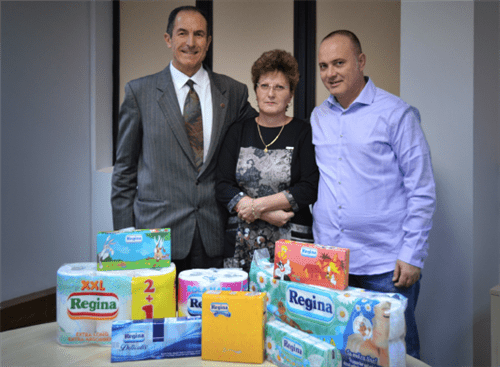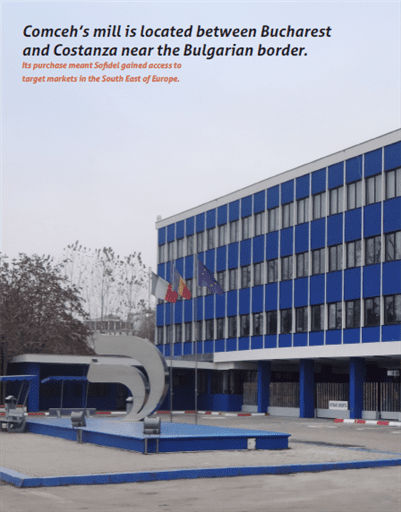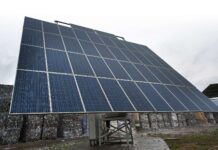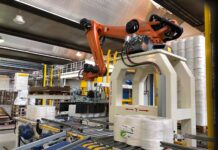By Helen Morris, Tissue World magazine editor
“Supporting the Volare brand and increasing the Regina brand’s awareness are key,” Carlo Ferrero, the Italian-born country operations manager of Sofidel’s Comceh, Calarasi-based tissue plant, tells TWM. “Sofidel is fairly new to the Romanian marketplace and to grow the presence of brands, it takes time to establish when you are new. However, we are now leading the Romanian tissue market and have a 23.3% market share.”
The Italian tissue giant completed the acquisition of Comceh through its Polish subsidiary Delitissue in 2010. The mill is located between Bucharest and Costanza near the Bulgarian border, and its purchase meant Sofidel gained access to target markets in the South East of Europe.
“The Romanian tissue market has seen a lot of changes in terms of the presence of retailers in larger cities.”
Originally established in 1964, the site now produces 37,000tpy of tissue paper reels and manufactures finished products for the consumer market, private label and AfH marketplace. A third converting line dedicated to the country’s growing AfH market was started up in 2013 and Ferrero says the company now sells specialties and new technologies into the AfH sector, offering different types of fibres in line with the sustainability policy of Sofidel.

The Romanian tissue market is primed for investment and innovation: it’s predicted to register a 4% constant value CAGR to reach US$190 million in 2018, and there is demand for 115,000tpy across the country’s near 20 million population. An increasingly steady economy, rising disposable incomes and underdeveloped tissue categories are rapidly changing the face of the market.
Kitchen towel is one example of a key growth area, having seen growth reach 7% in parts of the country in 2013 – the highest of any tissue category. Ferrero says there are parts of Romania that don’t use kitchen towel and that the product is still limited to higher-income consumers. “In 2007, the kitchen towel market here was very simple with little variety, the majority of products were yellow paper and single colour print,” he says. When the company installed the second converting line it introduced a new product into the market, a four-colour product. “You can compare it with what’s on offer in Western Europe. We’re seeing a lot more products with gifts, etc. There’s a lot of potential and at the very minimum we should see double the demand.”
He says some tissue and towel products have practically zero use in many parts of Romania, adding that before 1990 kitchen towel wasn’t available. “It’s very different in the big cities compared with rural Romania. In some rural areas they’re not using these products.”
Changing demographics have also dramatically impacted the demand for private label tissue products, which is also expected to experience further growth, although Ferrero adds not at the rate of in Germany where it dominates at around 83.

Value wise, 38% of the company’s products are private label, while brand makes up to 50%. “Here, the trend is very much moving towards private label, which in this area of Romania represents around 46%,” he says. “The economy is growing by
2.3%; in comparison to some other countries in Europe we are in a good situation. Ratio in terms of debt over GDP is at 39%, and Romania’s inflation rate is 1.2% in October 2014, with an unemployment level of 7.2%. Retailer sales are 4% and private consumption is 3.2%. in Romania.”
However, he adds per capita consumption is still at a low level in Romania (5 to 6Kg/person) with comparable countries. “In Greece it’s 12%, Poland it’s 13-14%… it’s because many older Romanians don’t have the habit of tissue and towel use. But we are seeing the demographics changing a lot, which is having an impact on habits. More and more single people are here in Romania and so we’re seeing a faster increase in the consumption of tissue and towel as a result.”
Some 87% of Comceh’s finished products are sold locally while the rest goes abroad to Hungary, Bulgaria and Poland.. Some 45% of its jumbo rolls are sold locally with the remaining exported into Poland, Bulgaria, the Czech Republic. “We will continue to supply abroad and boost our finished product, and also boost our AfH presence.”
“Sofidel’s move into the Romanian marketplace through Comceh has started to be successful, he says. “The mill here has seen different management styles from the beginning of the century and this shows the flexibility of the employees to accept and embrace different type of guidance and cultures. These past few years we’ve made a lot of changes with our workforce and you know, you can have all the best ideas in mind, but in the end you need a consolidated team of people to succeed. We hired new managers to get new blood and new ideas in and last, but not least, we have benefit of the high quality support and experience of Sofidel.”
“Over the next few years, brands are where our growth is,” he adds. “In 2014, our sales increased 5.4% and we improved our financial position. Operational wise, our focus now is on energy reduction and on costs optimisation to guarantee a more sustainable business. At the same time, we continue to strength our management and to develop the skills of our employees in order to become more competitive.”

































